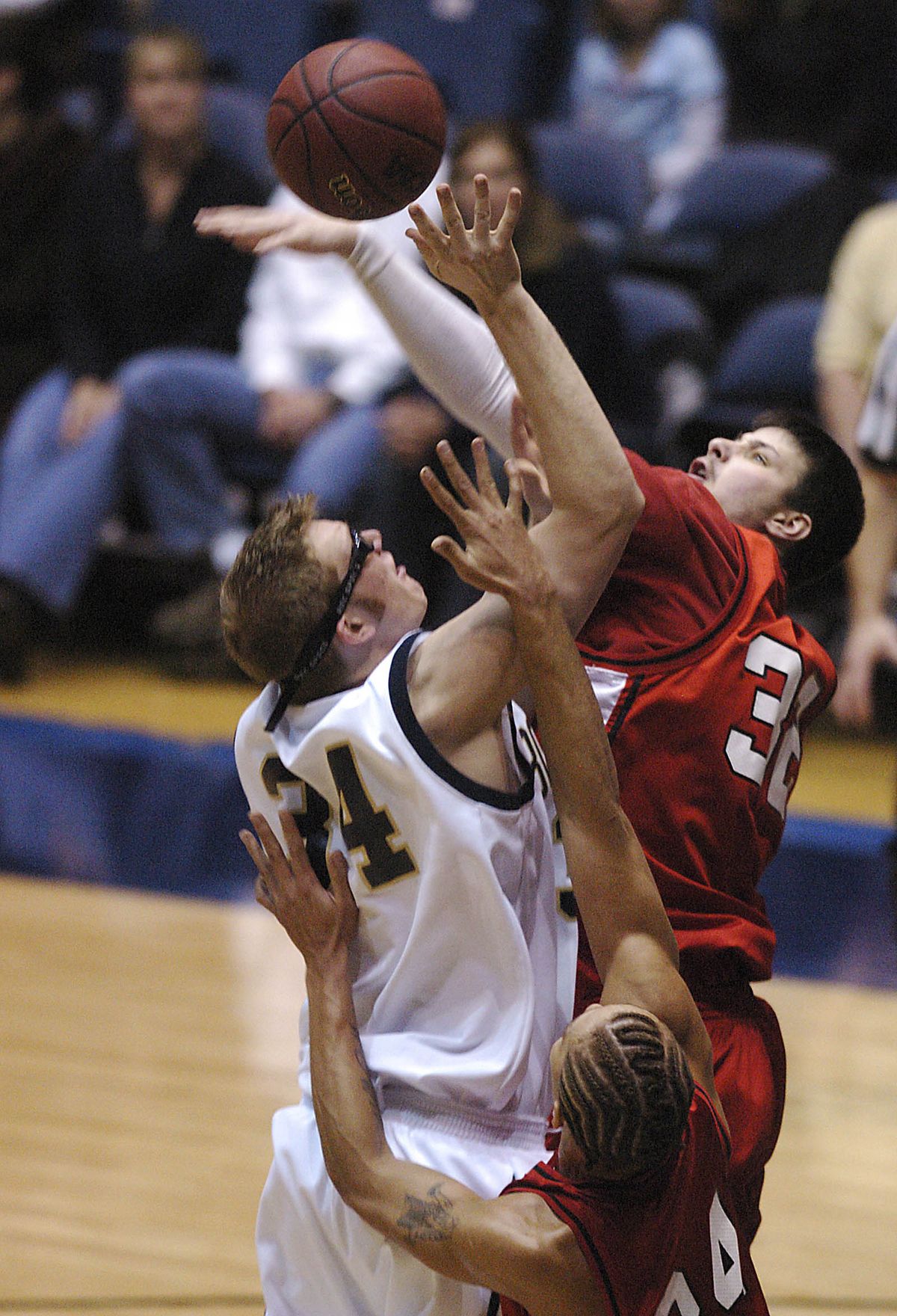Basketball transfers grateful for chance
Penoncello, Beitinger glad they left Eastern for Central

YAKIMA – Someday a college or university will hire an athletic director who will have a profoundly positive impact on the program, the school and the community.
Someday a counseling service will hire a person who might ultimately save someone’s life.
In the meantime, Matt Penoncello and Jake Beitinger will continue to do what they do. They will continue to be exemplary teammates on Central Washington’s basketball team, devoted husbands to wives Kellyn and Michelle, and students of which any institution of higher learning would be proud.
And long before Penoncello pursues a career in athletic administration and Beitinger delves into psychology, which they plan to do in graduate school, they will set themselves apart from many contemporaries.
Because they’re grateful.
They’re appreciative of their lots in life, to be building futures on a foundation of education, competition and compassion. The me-first mentality so prominent among many collegians, athletes and otherwise, seems not to have affected these two.
Maybe it’s because they’d been disappointed at Eastern Washington before transferring to Central. Or maybe it’s just who they are.
“I will never forget,” said Karl Albrecht, a 68-year-old CWU assistant coach, “being in the hospital after having a stroke last June, and both Jake and Pen showed up the very first day.
“Pen, in fact, came to visit for seven or eight days straight. Even after they sent me home and my wife was serving as my nurse, he’d come in and help out for an hour or two each day.”
Said Penoncello: “He takes time out of his life to help coach us. He could be living somewhere warm and golfing every day, but he’s still here helping us.”
Said Beitinger: “As Karl would say, give credit where credit’s due. Matt actually saw him more than I did, but I was in the middle of trying to get married.”
Which he and Michelle, whom Beitinger met while at Eastern, were in July. Matt and Kellyn, who also met at EWU, were married the previous summer.
Penoncello and Beitinger are both 23 now, and both are seniors at Central who were recruited to Eastern by then-Eagles coach and former Wildcats assistant Mike Burns.
Beitinger, out of South Kitsap High School in Port Orchard, Wash., stayed in Cheney for two years before leaving school and working in Issaquah, Wash. Penoncello, from Moscow, Idaho, remained at Eastern until Burns was fired on June 1, 2007 – an unusually late time of year for such action.
“I didn’t think that was the best decision for myself and my teammates,” Penoncello said. “I wanted to be somewhere where the administration was taking care of kids and making the interests of the kids a priority.”
The place, for both players, turned out to be Central. Yet while they’d roomed together at Eastern, Penoncello and Beitinger did not come as a package deal.
Beitinger, in fact, had seemingly washed his hands of college basketball and was planning on “just being a student,” as he put it, at Idaho State.
“Then I read in the paper that Matt was coming to Central,” he said. Soon thereafter, so was he.
The connection was G.E. Coleman – son of the late Gil Coleman, who had succeeded Dean Nicholson at CWU. Coleman had assisted Greg Sparling at Central, then had gone to Eastern with Burns before returning to Central for the 2007-08 season.
And while the addition of a multifaceted 6-foot-5 swingman like Penoncello and a 6-8 shot blocker-scorer like Beitinger looked good on paper for the Wildcats, there were no guarantees.
Transfers don’t always work out. Sometimes it’s the system that the player doesn’t mesh with. Sometimes it’s his teammates, or the coaches, or the culture.
“You always roll the dice with D-I drop-downs,” Sparling said. “The first thing you worry about is egos. Guys who come here don’t get the five pairs of new (basketball) shoes or the three sweatsuits they get at bigger schools.
“We don’t have catered meals before games. We eat at Subway and Quiznos. But nothing like that, or stats or anything else, has been a problem with either of these two. We couldn’t ask for better players, and the university couldn’t ask for better young men.”
The players/young men, meanwhile, are quick to emphasize that they, too, have benefited. Taking basketball out of the equation – a substantial omission since they’re Central’s two best players – both say they have received welcomed and needed guidance while being allowed to mature.
“They help you here, whether it’s finding the right class for your situation or getting into a class or helping with a class once you’re in it,” Penoncello said. “They talk about it at Eastern, but nothing usually happens. Here they don’t even talk about it, they just do it. And they allow you to be men.”
While still having fun playing a kid’s game, of course, and clinging to the last vestiges of youth.
“I’ll always remember playing basketball here, obviously,” Beitinger said. “The road trips with the guys – going to Vegas and even to Montana State Billings, where they lost our luggage. Those have been experiences I’ll never forget.
“But my life here has been good, too. I was talking with my wife once, about how all the times we’d driven by Ellensburg and I don’t think we’d ever even stopped and even gassed up. But I always thought it looked pretty cool.”
Penoncello agreed. And while his thoughts turned to the future, when perhaps he’d have his own on-campus office somewhere, they included a look back.
“One of the things I’m eagerly anticipating,” he said, “is reaching a point where I can start helping this university financially – when I can start paying back.”
Because he, like his friend and teammate, is grateful.